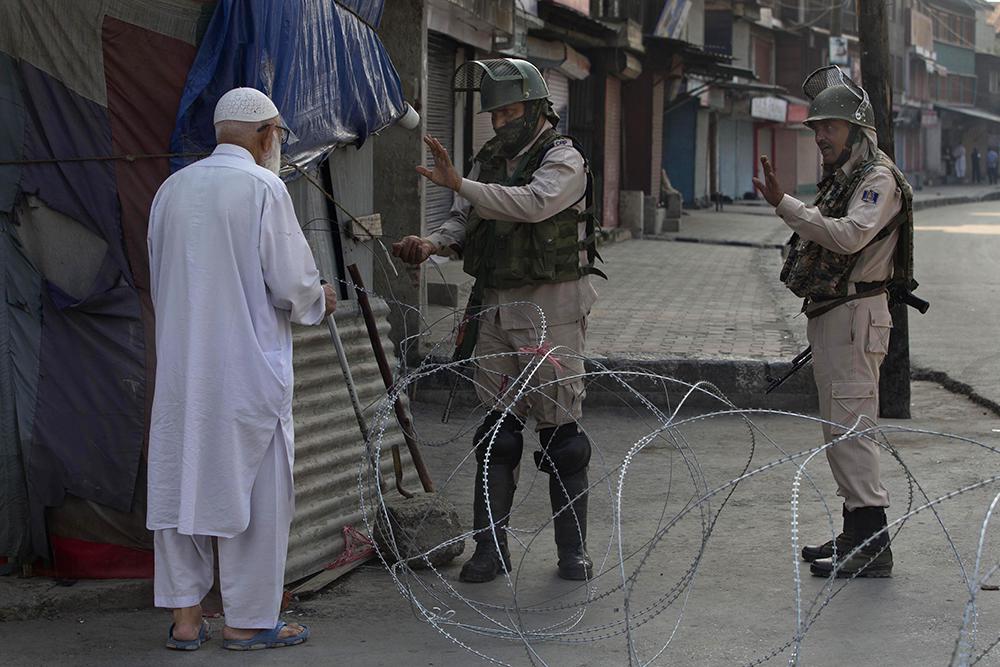
© 2019 AP Photo/Dar Yasin
As the whole of India awaits in anxious lockdown, prominent journalists from Kashmir, Peerzada Ashiq and Masrat Zahra, civil society activists, and student protestors have been charged and arrested by the police under the Unlawful Activities (Prevention) Act 1967 (UAPA). Of those who have been arrested, one is Safoora Zargar, a 27-year old research scholar who is currently in the second trimester of her pregnancy. Much like others who have been charged under the UAPA, she was a part of the peaceful protests organised in December against the Modi government’s Islamophobic citizenship law.
The UAPA is a draconian law that deals with two fundamentally different kinds of criminal conduct: unlawful activities and terrorism. Section 2(o) of the Act defines “unlawful activity” as acts causing or intended to create “disaffection against India”; section 13 penalises “unlawful activity” with up to seven years imprisonment. The Act defines offences vaguely and broadly and fails to distinguish between criminal speech (that has the propensity to incite violence) and legitimate criticism and dissent against the State. In doing so, the Act encroaches on protected constitutional rights of speech and association.
Section 66A of the Information Technology Act 2000 that criminalised “grossly offensive” or “menacing” online speech was declared unconstitutional by the Supreme Court (SC) on the grounds of overbreadth and the provision’s chilling effect on free speech (Shreya Singhal v. Union of India). Absentee this provision, the executive now is resorting to the UAPA to suppress free speech on the internet. Notably, the Indian Penal Code (IPC) already criminalises speech that causes “disaffection” against the State (sedition, section 124A); why invoke the UAPA at all then? This is because the UAPA does away with ‘due process’ intrinsic to the conventional criminal trial. It allows for citizens to be held in custody for six months without disclosing the charges framed against them [section 43D(2)]; it disallows anticipatory bail [section 43D(4)]; reverses the presumption of innocence (section 43E); allows improperly obtained intercepted communications to be used as evidence (section 46). Bail is so stringent as to be almost almost unavailable; activist Teltumbde’s temporary bail plea—on the grounds of him suffering from respiratory problems and being at an increased risk of contracting COVID-19 while in prison—was recently rejected. Additionally, section 124A IPC contains three ‘explanations’ that narrow down the scope of the offence; no such mitigation is provided under the UAPA. The minuscule conviction rate under the UAPA suggests that the aim is to simply keep dissidents behind bars for extended periods; the procedure itself being the punishment.
Indian jurisprudence advocates for a standard of proportionality where the least restrictive law must be applied when a fundamental right is being curbed. Further, the limitation imposed on fundamental rights should not be arbitrary or of an excessive nature. The non-use of sedition law in favour of the UAPA—to sidestep procedural rights accorded to the accused—reeks of arbitrariness, and violatives the ‘least restrictive measure’ standard.
This situation also raises a question of ‘equality before the law’, as secured by Article 14 of the Indian Constitution. For instance, if there are two persons, both of whom have separately indulged in acts causing “disaffection” against the State. It is presently open to the executive to charge one under the IPC and the other under the UAPA. Thus, for the same offence, one person would face a regular trial, while the other would undergo a much harsher procedure. This discriminatory treatment would entirely depend on the whims of the executive, and would fall foul of the constitutional commitment to equality.
This contention was accepted by the SC in the case of Maganlal Chhaganlal. Bhagwati J. had observed that where “two alternative procedures are available, one more drastic and prejudicial than the other, and no guiding policy or principle is laid down by the legislature as to when one or the other procedure shall be followed, so that either procedure may be indiscriminately adopted against persons similarly situated, the law providing for the more drastic and prejudicial procedure would be violative of the equal protection clause.”
The abuse of this extra-ordinary legislation in a time of pandemic is regrettable and frightening, especially when democratic safeguards are at their weakest. First, concerned citizens cannot mobilise or protest owing to a nation-wide lockdown. Second, the judiciary, including the SC, is functioning at minimal capacity. Unfortunately, the SC has not issued any clarification on what matters may be categorised as “extremely urgent”, and therefore there is scope for arbitrary exercise of discretion. Third, the lockdown significantly compromises an individual’s ability to access legal representation and prevents civil society groups from stepping in either. The erosion of democratic accountability is compounded by the absolute silence in mainstream media about these arrests and detentions—under the smoke-screen of COVID-19—which creates fertile ground for human rights abuses by a strong executive.
The need to protect free speech is exceptionally high during the COVID-19 pandemic, where the invocation of the National Disaster Management Act 2005 at the federal level and the Epidemic Diseases Act 1897 at the state level, has given governments sweeping powers, with almost no legislative checks upon their exercise or limitations. Stifling criticism inhibits individuals from voicing genuine concerns against the government’s management of the pandemic, and prevents meaningful improvements to the response strategy. Moreover, free speech is a crucial bulwark against the abuse of governmental power. Charging journalists and activists under the UAPA has a chilling effect that hinders the ability to speak truth to power in these incredibly trying times.
